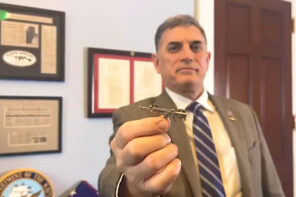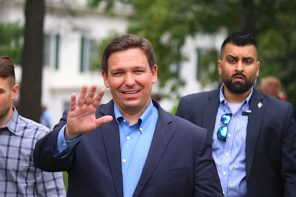According to early reports, Black Friday, the annual start of the holiday shopping season, was only modestly better than last year. Many are hopeful that today, Cyber Monday, will offer a more reassuring sign that Americans continue to have faith in the economy by sacrificing their hard-earned cash during this season of giving. Time will tell whether holiday shopping has any significant impact on the sluggish economy, but you can bet that a door-busting pile of reports, commentaries, and opinions will surface over the next few weeks about the mood and spirit of the nation’s shoppers. Shopping and buying, selling and spending—mundane, prosaic activities, or a matter of national life and death?
This Christmas, the haunting spector of impending economic calamity will compete with the candlelit nativity scenes representing the glorious birth of Christ. Indeed in this light, the recent “shellacking” of Democrats—as President Obama put it—in the midterm elections points to an obvious yet underanalyzed dimension of political life today: the economy is sacred, and “free enterprise” is a religious commitment of the highest order to most Americans when the chips are down and the recession is deep. Forget social services, forget education, forget sexual orientation, forget health care, forget the environment, forget the forgettable arts—anything that keeps Americans from their hard-won incomes and dreams of financial freedom in a free market is a disgrace, if not downright devilry.
Tea Partiers and party-challenged Republicans are basking in the glory of their victories, secure in the knowledge that a message pitting the “little man” against the “big government” resonated deeply and widely for many Americans in the first decade of the 21st century who hate government, love the military, fear Muslims, cherish the family, dream of the return of a white America, believe in secure, impermeable national boundaries, and remain deeply suspicious of intellectuals. They also agree on one particular matter of doctrine: money is everything, the pursuit of wealth is inviolable, and to be rich is to be… saved.
Money is sacred. Capitalism is a religion. Yawn. How banal do these statements sound? Surely they are not referring to anything approaching “real” religion and what is “truly” sacred, but only metaphoric language that confuses economic commitments with religious sensibilities. So the Almighty dollar has “In God We Trust” on it? Who cares if the utterly inaccessible intellectual Walter Benjamin wrote an obscure essay called “Capitalism as Religion”? No one will ever read a boring scholarly article in the Journal of Economic Psychology called “The Sacred Meanings of Money,” right? And who in their right mind would read a blog on the sociology of money at “filthy-lucre.net”?!!!
Christians in particular understand the dangers and temptations of mammon. They have a long history of warning against worshipping this false god, a point of great emphasis in the New Testament and tied to concerns about wealth, debt, and greed. For many good Christian Americans, the boundaries between religious life and work life are clear, separate, distinct. For some, it’s the Jews who demonstrate an unhealthy mix of religious orientation and love of money.
Am I stepping out of bounds by raising the possibility that perhaps a good many Christians who love this country, and who hate this president and blame the government for all that ails them, are religious in ways that are not so readily apparent in their own self-image? The modern history of how religion intersects with economic interests is a complex picture, to be sure, and one that gets only the rare scholarly treatment, save for classics like Max Weber’s The Protestant Ethic and the Spirit of Capitalism and more recent sociological studies like Robert Wuthnow’s God and Mammon in America.
A few questions may help make the case about the intimate, if unexpressed, links between money and religion: Is the pursuit of wealth an ultimate value? Is self-worth tied to the accumulation of material goods? How do moral virtues connect to marketplace success? Is money a means to transcend everyday suffering and despair? Would you die to save capitalism?
The society we live in, and indeed the political landscape for the foreseeable future, is populated by voting citizens who idolize financial success and believe that a free market and the pursuit of individual wealth is ordained by a God who favors the rich over the poor, free market over social justice, capital investment over government services.
But these religious values are not simply tied to such trite religious notions as “belief” or “worship.” No, the religious cult that is taking over local politics and church pews, state houses and megachurches, and presidential primaries and segments of Congress is not interested in theological ideas or reverential attitudes. This is a cult, as Benjamin well knew even in the 1920s, built on othopraxis, not orthodoxy—it’s not what you believe, but how you act.
The actions of believers are much more significant than words or arguments: vote out those who will get in the way of you and your money (i.e., “socialists,” “tax-and-spend liberals,” “Democrats,” etc.); use town hall meetings to promote scripted, digestible sound bites that echo the media propaganda machines hammering home simplistic though comforting messages (i.e., “the federal debt is a moral issue,” “health care reform equals death panels,” “America is a nation chosen by God,” etc.); and building coalitions can unite Americans against dangerous liberals who want to promote anti-capitalist agendas (i.e., “global warming requires urgent action,” “save the entitlement programs,” “more taxes will solve all our problems,” etc.).
As we get further into the holiday shopping season, the take-home message from the current political shift is clear and unequivocal, at least to me: it’s not the economy, stupid, but that the economy is sacred. Thanks to a combination of new school Tea Party spice and flavoring from the old-school Religious Right, the Republican Party miraculously disguised the emergence of a new cultic devotion to money while simultaneously making it appear to the American public that their values are sanctified by God. The Democrats, on the other hand, failed once again in understanding the allure and power of sacred symbols and actions to promote their vision of the economy, and the future of this nation.
At least one national pastime can unite Americans of all political stripes: shopping. Thank God for Santa Claus.




